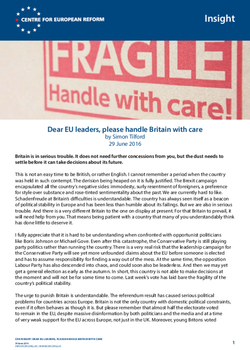
Dear EU leaders, please handle Britain with care
Britain is in serious trouble. It does not need further concessions from you, but the dust needs to settle before it can take decisions about its future.
This is not an easy time to be British, or rather English. I cannot remember a period when the country was held in such contempt. The derision being heaped on it is fully justified. The Brexit campaign encapsulated all the country’s negative sides: immodesty, surly resentment of foreigners, a preference for style over substance and rose-tinted sentimentality about the past. We are currently hard to like. Schadenfreude at Britain’s difficulties is understandable. The country has always seen itself as a beacon of political stability in Europe and has been less than humble about its failings. But we are also in serious trouble. And there is a very different Britain to the one on display at present. For that Britain to prevail, it will need help from you. That means being patient with a country that many of you understandably think has done little to deserve it.
I fully appreciate that it is hard to be understanding when confronted with opportunist politicians like Boris Johnson or Michael Gove. Even after this catastrophe, the Conservative Party is still playing party politics rather than running the country. There is a very real risk that the leadership campaign for the Conservative Party will see yet more unfounded claims about the EU before someone is elected and has to assume responsibility for finding a way out of the mess. At the same time, the opposition Labour Party has also descended into chaos, and could soon also be leaderless. And then we may yet get a general election as early as the autumn. In short, this country is not able to make decisions at the moment and will not be for some time to come. Last week’s vote has laid bare the fragility of the country’s political stability.
It's hard to be patient when confronted with opportunist politicians like Johnson or Gove #Brexit
The urge to punish Britain is understandable. The referendum result has caused serious political problems for countries across Europe. Britain is not the only country with domestic political constraints, even if it often behaves as though it is. But please remember that almost half the electorate voted to remain in the EU, despite massive disinformation by both politicians and the media and at a time of very weak support for the EU across Europe, not just in the UK. Moreover, young Britons voted overwhelmingly to stay in the Union, as did a significant majority of those under the age of 50 years old, and these age groups are the future of the country.
For the millions of young who didn’t turn out to vote and whose futures have been damaged, the referendum result will act as a major wake-up call. As it will for those older people who voted to leave because they wanted to vent their frustration at the government, not because they supported Britain leaving the EU or appreciated the consequences of doing so. The outpouring of xenophobia during the campaign and in its aftermath has left millions of Britons feeling like they do not know their country anymore. And there is very genuine sadness. Pro-European Britons may not emote about the EU but for millions of us being English (or Welsh), British and European is an important part of our identity.
Xenophobia during & after #EURef has left many Brits feeling they don't know their country anymore
Britain does not need further concessions from the EU, but it does need time for the dust to settle. If it gets this, it is likely that for the first time in decades Britons will have a proper, informed debate about the EU and what Britain gains from membership of it. It will no longer be possible for the Brexiters to cynically claim things that are manifestly not true. After all, they have withdrawn all the key claims that won them the referendum, proving their campaign was mostly demagoguery. Britain will rightly face a choice between the single market and free movement. Those British politicians who want controls on labour movement will have to convince the British that this will be worth paying a heavy price for, not just economically but also in terms of massively diminished political influence within Europe. As you know, the British have tended to disparage the political (and security) benefits of EU membership, but will now have to have a more honest discussion about the broader benefits of being in the EU.
#Brexiters withdrew key claims that won them the #EUref proving the campaign was mostly demagoguery
As voters become aware of the formidable economic and political costs of quitting the single market, and come to understand how they were misled by a Brexit campaign that promised different (and contradictory) things to different groups, it is hard to imagine how a majority will not emerge for staying in the EU. This may not be possible – it would require a further referendum, which British politicians may balk at, as it would mean going against the will of the people as expressed in last week’s referendum. But it would still leave open the possibility of EEA membership, and from there it might be possible for the UK to rejoin the EU. After a few years in the EEA abiding by EU rules but having no say over them, the British could find EU membership very attractive.
A chastened, more modest Britain can emerge from this debacle, so long as moderate forces within the country are given time to gain the upper hand. Thankfully, many of you appear ready to give Britain that space. This is very generous in the case of Eastern European governments, who have witnessed appalling resentment and racism directed at their citizens working in the UK. Hopefully, those of you who believe Britain belongs in the EU and that the EU would be weaker for its loss, can persuade the more sceptical among you to cut Britain some slack.
Simon Tilford is deputy director at the Centre for European Reform.
An oped of this insight was published in Spiegel online in German here.

